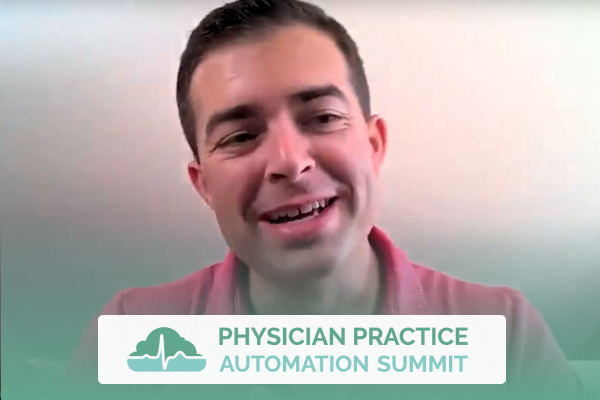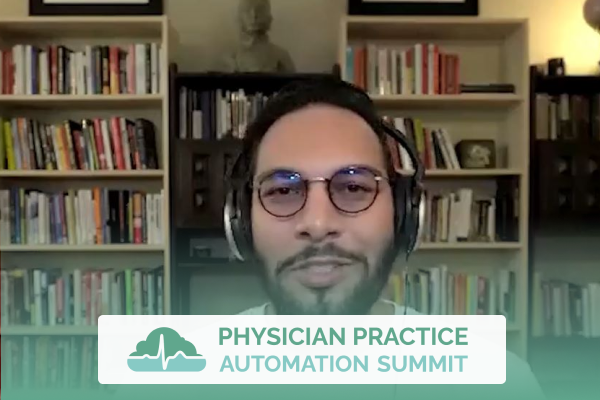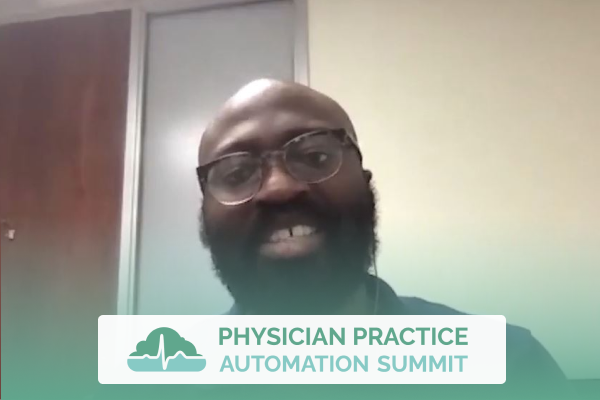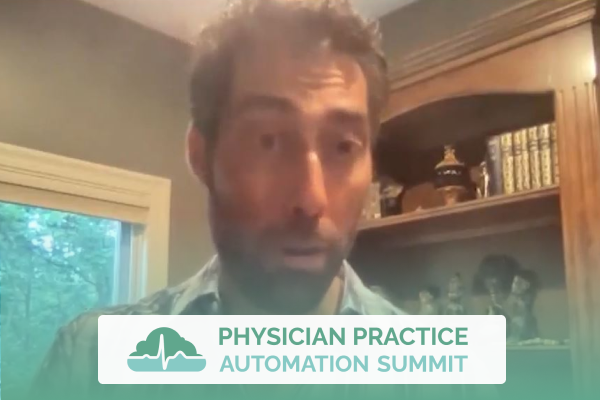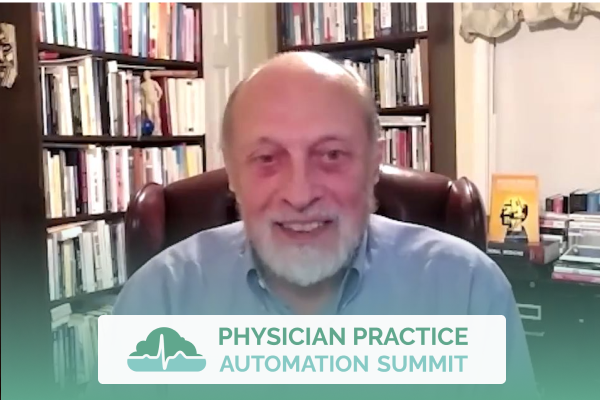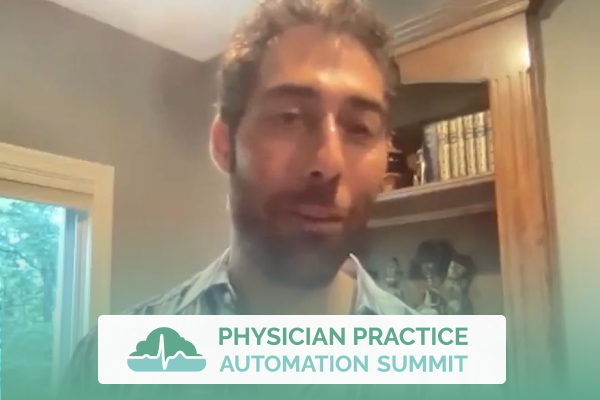Join the discussion below

Dr. Ruan is the Founder and CEO of Texas Center for Lifestyle Medicine. He devotes his career in practicing and building systems that allow for efficient delivery of healthcare. He is a board certified internal medicine physician but also have advised with companies to improve their workflow, company culture, marketing,... Read More
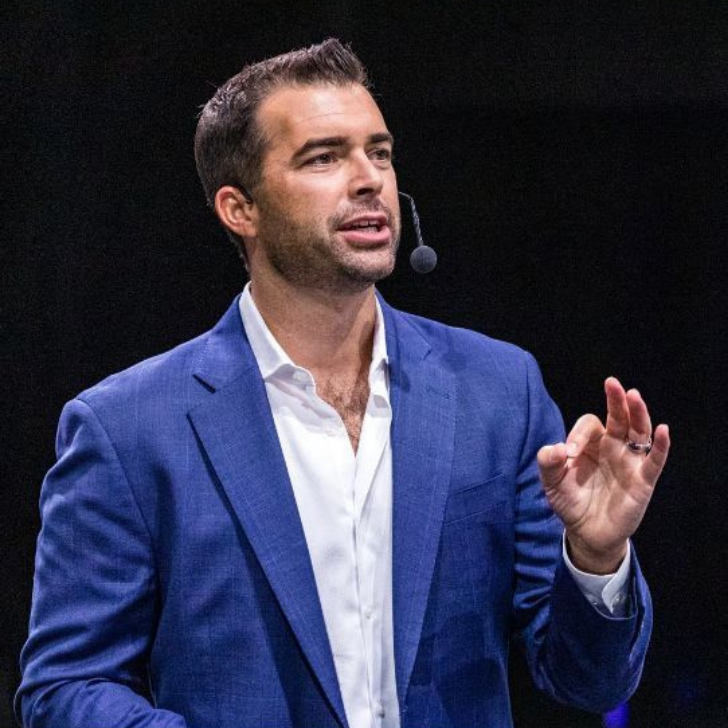
Tyler McBroom is a CPA and Founding Partner of his firm, MMC, as well as the United States partner in Tony Robbins' Global Accounting Advisors Alliance. His mission is to help business owners around the United States grow their profits while paying as little tax as legally possible. Tyler recently... Read More
Cheng-Huai Ruan, M.D.
Hi everybody, it’s Dr. Ruan. I am super proud to introduce Tyler McBroom to the stage. And Tyler’s a CPA, but he’s a CPA with a million Instagram followers. Number that I think anybody can get, million Instagram followers, being a CPA and putting out CPA things, but thus is the industry. But Tyler is the founding partner of his firm, MMC as well as the US partner to the Tony Robbins Global Accounting Advisors Alliance. So his mission is to help business owners all over the United States grow their profits, while paying as little taxes as legally possible. And Tyler recently published his book, Cashflow & Growth, which teaches business owners the financial habits and routines they need to implement in their business to grow profitably and increase cash in their bank accounts. So Tyler and I actually met in a Tony Robbins business mastery event. And we had a really, even though it was a short 10 minute conversation, it was very enlightening. So today, I’m gonna have him on talk about a whole lot more that pertains to medical practices in the operations of business and what he’s up to, in the very near future. We’re so excited to have you and see you again, well, virtually, of course.
Tyler Mcbroom
Yes, excited to be here. Thanks for having me.
Cheng-Huai Ruan, M.D.
Yeah, I know, you got a lot of stuff going on in your life right now. So do I am, so do rest of us. So I mean, the time is really precious. But you know, speaking of time, we wanna be able to make sure that whatever the heck it is we do that we spend time on, we get money for it, and then we keep it. So there’s another segment where I interviewed other primary care doctors. And both doctors said, you know, the biggest lesson that they learned ever since starting the practice is not about how much money you make. It’s about how much money you keep. So let’s explore that concept a little bit about how much money you keep. Can you kind of just dive into that fundamental concepts and how taxes tie into it?
Tyler Mcbroom
Sure, yeah. So first off, I think that’s a huge concept to grasp. Because most people, you know, you know, virtual event here. But most people when you go to conferences, when you go to these mastermind groups, and everyone says, how are you doing? Well, they’re always measuring their yardstick against revenue growth, right? It’s never what’s actually coming to the bottom line, or even more importantly, what cash do you have, is your cash growing in your bank account. And so focusing as you’re growing your practice and your business on what’s actually coming to the bottom line is a huge concept that, like I’ve been trying to hammer into business owners heads, so I’m glad you’re talking about it. How it relates to taxes, is taxes are your largest expense in your life.
You know, most people think it’s a you know, it’s your marketing costs. Or it’s, you know, when it comes to your business and your personal life, your income, your largest expense is taxes. And what most people don’t realize is, there’s really two tax codes in the United States. There’s a tax code for employees, which is pretty much you show up, you get withholdings taken out of your paycheck, you can buy a home and deduct the interest, you can give money away to charity, and deduct that. And that’s pretty much what you can do to lower your tax bill. Then the other tax code is for business owners. And that is a whole new world of tax code. Literally, the tax code is so thick, that if we printed it out, and I held it in front of me and you stood across the room with a colt 45 magnum and shot at me, you could not pierce through the tax code and hit me because it’s so thick.
Cheng-Huai Ruan, M.D.
I’m expecting to see a video on that on Instagram.
Tyler Mcbroom
I know, that might go viral, right? So what does that mean? It means that you most people, especially when they’re new business owners, they think in terms of the employee tax code, and they never actually go and do any proactive tax planning. They just, okay, it’s February, March, it’s time to file my taxes because I saw the TurboTax ad on the Superbowl. And so let’s go file my taxes. What you wanna do is meet throughout the year, at the very least before year end, or you can meet with your CPA and say, okay, if we do nothing, your tax bill is gonna be X, let’s do one, two, three, four action items, and drop your tax bill by 30 or 40, 50%, sometimes by 100%. And so most new business owners and frankly people who have been in business for 10, 20 years sometimes don’t realize what you can do to increase your cash through tax planning. And that makes a huge difference in your overall business.
Cheng-Huai Ruan, M.D.
Big time. You know when I was listening to you talk on stage at a Tony Robbins business event. This is probably about three weeks before the pandemic took over the country, in Florida. And one of the things that you said really captured my attention, is what you just said just now it’s like you know a lot of these conferences they talk about hey, let’s let’s have a measure of your revenue. Let me ask you this question not to criticize the government or anything like that but whenever people started looking at PPP qualification the language in there was actually you know how much revenue brought in not profitability. So a lot of medical practices spent a lot more fixed costs, even though the revenue was still growing, but their profitability was either shrinking or going negative during pandemic. Do you know why that revenue number was we put in for the coffee’s and PPP? And if you don’t, like how should we prepare for that?
Tyler Mcbroom
Yeah, that I don’t know, as far as why they use revenue on that versus any other qualification. I think it is because it’s such a simple number that people can comprehend. Most people, when you ask them, even when we do it at like business mastery, where you when we schedule our appointments. And we try to ask them, what’s your net income? They don’t even know what that number, what that means, a lot of times, so like that people hear revenue, they hear you know, so it’s something that they can comprehend. So that’s the only thing as far as why I could think that because it’s easy. And they tried to make it as simple as possible. There’s such a lack of financial education in the business owner worlds.
And that’s actually the number one reason. And Tony talks about this in business mastery. The number one reason, you know, 50% of businesses fail in five years. And I forget what the number is after 10 and 20. But it’s almost always because there’s a lack of capitalization or lack of financial knowledge. And that starts with not knowing the basic terms of what net income is, and cash flow and projections and planning. And so as far as to answer your question about why the government use revenue is the only answer I can think of is, it’s something that’s understandable for most people.
Cheng-Huai Ruan, M.D.
The reason I asked this is I made a very interesting observation. So I have practices that are owned by friends of mine, who didn’t meet the qualification for the PPP, and it’s because they actually grew. However, from a profitability standpoint, they were really not doing very well. And on the verge of closing down, it was really bad. And then I have other friends of mine, who had the opposite. They purposely had the revenue down, but they dramatically decrease fixed costs, right?
Tyler Mcbroom
So they made more money. And then PPP.
Cheng-Huai Ruan, M.D.
Exactly. So I’ll give you like, know, what we did. And we’re kind of in between is, we had the, you know, moment, the very beginning. And then what happened is, we have three locations and we closed two, and ultimately we close that the last ones again, to get a small square footage, because we went from 5% telemedicine to 86% telemedicine. So I didn’t really need office space. And in fact, that’s the model we’re gonna continue on, we’re not gonna even open . But that also allow me to use virtual assistants, which also dramatically reduce costs. So even though the revenue was down, right, but the profitability was up, operating cash flow was dramatically up just in a couple months, right. But then, you know, like, even companies like mine, do you qualify for the PPP. So I feel like a lot of doctors are asking oh, did you qualify does not qualify, oh, you must be doing well. I mean, that’s not what this is all about. It’s all about how much money you keep, right?
Tyler Mcbroom
Yeah. Yeah, and, you know, it’s interesting doing any sort of business planning around once in 100 years. You know, government gifts, so to speak, is difficult, because by the time everyone figured it out, it was already sold out. So that’s sort of like there were some lucky winners and some unlucky losers in the way that that was categorized. And so yeah, if they’re, you know, they used it based on revenue drop. So if you were able to drop your revenue, but also figure out ways to operate more efficiently, that’s just good business, and you’re a lucky beneficiary of still getting the PPP loan. There’s a lot of businesses that are meet with pandemic or not, you know, new normal or not, just because it grows your revenue doesn’t mean it’s the right business decision anyway. So I think that’s a good exercise that every business owner should do.
When you’re analyzing your business, you not just say okay, is my revenue growing, you say what sources are my revenue coming from, and what are my costs related to those sources. So it sounds like that was an exercise you kind of were forced into doing to switch to telehealth. But if you just been going along and had a telehealth practice and had an in person practice, and then went and looked at the direct costs of the telehealth versus the direct costs of the in person and done that as an exercise, as part of your annual planning, your semi annual planning, you might have realized, hey, let’s lean into this new method because it’s more profitable.
So it was interesting how the pandemic sort of forced people to look at their business model. And there’s been people that have been able to pivot and there’s been people who have been caught flat footed, and haven’t been able to pivot. In the restaurant business, there’s people who were, you know, the restaurant business got crushed industry . But there’s a couple of clients that we know, that took their place where they were unable to operate, they moved it into a warehouse created what’s called a ghost kitchen, where they were able to cook food for 10 different cuisine types, instead of next to, you know, offices and delivered food and became way more profitable, because they didn’t have to create, like, you know, well themed, well maintained restaurant space, it was just a warehouse where they created, you know, blast the food out. So that’s like the restaurant version of your telehealth. So it’s, you know, looking at ways of again, and their revenues went down relative to that, but their profitability and their cash flow went through the roof. .
Cheng-Huai Ruan, M.D.
Yeah, is enormous. Yeah, the restaurant business and the medical business have a very similar fixed expense. And that’s something that you know, I actually know, personally from the restaurant business, but here’s the thing, I think that what you said earlier is right, and you can’t plan for 100 a year, you know, pandemic style PPP. But I think that was a lesson, like you said it was a lesson for me, it was a lesson for a lot of business owners to figure out how to pivot. And really, like dive in and understand the actual money component.
But what’s not in once in 100 years is taxes, because taxes is basically that vehicle that lets us know, and gauge exactly how much we’re keeping, how much we’re not. But at the same time, even beyond taxes, I think that, you know, I think that the title of your book is Cashflow & Grow, right? It’s not reduced taxes and grow, is taxes is one of the vehicle to improve that tax flow. So I wanna kind of get into your book a little bit because you know, I haven’t read it. So why did you write the book? And why did you name it that? It’s very interesting. I thought taxes will be in the title.
Tyler Mcbroom
Yeah, actually I think a lot of people were surprised by, there’s only one chapter really, that even talks about taxes. Because,
Cheng-Huai Ruan, M.D.
really, from a CPA.
Tyler Mcbroom
here’s why. Here’s why. Tax laws are always changing. I wanted to write a book that was evergreen for business owners, especially business owners that are starting out, that have no concept of how to plan financially for their business. And so what the book Cashflow & Grow is it’s all the financial habits and routines that you need in your business to grow a financially healthy business, so that you can actually sustain success and not just sell a bunch of revenue and then go out of business in two years, because you didn’t plan for your cash.
Now taxes are a part of that, but they’re not the only piece of that. And if I had to, you know, and I guess I could have written a book all about taxes and part of it I just didn’t wanna go into the legwork of citing every piece of the tax code, you know, that’s just not what I wanted to spend my time doing. And then I guess I could have had a book that needed a new addition every year that would be good for book sales, right? But I wanted to create a book that every new business, those based on the handbook for every new or new to actual financial planning, like real business owner, so that they could start learning the basics and the essentials that needing to do around the financials of their business.
Cheng-Huai Ruan, M.D.
It’s so funny, of one chapter on taxes, that’s hilarious, but at the same time, that means you know, what’s essential, and what’s essential is not just learn about tax code, what’s essential to have the psychology around the business, right?
Tyler Mcbroom
Yeah, and I’d much rather you read about that and understand the psychology and concept around tax planning, and then go meet with your CPA, and get the real updated current tax law. You know, hear it and discuss it, see if it makes sense for your business.
Cheng-Huai Ruan, M.D.
So you know, I’ve been following your Instagram for a while and congratulations on 1 million followers. That’s fantastic. And then my CPA gets so annoyed because I sent him like 50 of your posts. I’m like, can we talk about this? Like, what is this? I never even heard of this. And I think that the CPAs are like, people dependent or firm dependent, if you will. And there’s some that crunch number for you, and some that really help you understand that cashflow & grow philosophy, right. And so it’s like practicing medicine, sometimes you have, you know, doctors specific specialize in one thing, and sometimes there’s something else. And it’s been, it’s quite different. So, let’s get into that for a second, like, are there like, what would you categorize like, the different types of CPAs there actually are, and not only that, like, how do we, as physicians choose?
Tyler Mcbroom
Yeah. So there’s a number of basically, everyone thinks if you’re a CPA, oh, you can do my taxes. And there’s actually a whole other side of the CPA profession, which is called assurance. And that’s audited financial statements, reviewed financial. So it’s doing all that. So when people think you get an audit, there’s two types of audits. There’s what everyone thinks, which is an IRS tax, like a tax audit, they come in, they look at all your numbers and say, you owe an extra $50,000 in taxes, because you took the wrong deductions. The other side is getting an audited financial statement, which is usually you don’t learn about that until you go to your bank, and they tell you, you need one.
But what that is, is the CPA firm, it’s not the IRS, it’s an actual CPA firm, going in and looking at your books, confirming cash flows, confirming balances with vendors, doing all this kind of forensic work on your books so that you can go to the bank and say, this is really what I made in my business. Or if you’re about to sell your practice, you can increase the value of your practice or your business by getting a reviewed or audited financial statement, because it’s someone going and saying, this is legit, this is what I’m actually making. So it reduces the risk of the person buying the book of business. Almost no one knows about that side of the public accounting profession, until their bank tells them to, basically. So if you’re thinking about selling your practice, in a few years, having three years in a row of auditor reviewed financial statements can significantly increase the value to a potential buyer.
That’s something that’s totally separate from tax planning. The other side of the profession is doing the tax returns, you know, there’s a lot of CPAs out there, just fill out the forms. And so that’s the whole, you know, the employee side of the tax code, where you go to your accountant, you drop off your receipts and your bank statements, and then they tell you how well you did or didn’t do last year, you should not hire a CPA that only does that if you’re a business owner, because all we’re doing is we’re just, we’re just historians filling out the forms. And frankly, in today’s 2021, or depending on when you’re watching this on replay world, you can use technology to do that for you, you don’t need a human plugging in your numbers, you just don’t.
And so you need a CPA, or a tax professional, who works with you in a proactive manner to help you, sit down with you and say what’s happening over the next three months, the next six months, the next year to five years and say, okay, based on your business goals and your personal life goals, let’s craft a plan. So it might not always be lowering taxes. But a lot of times usually, especially if you’re in growth mode, it is lowering your taxes. But your CPA should not just be filling out the forms for you, they should be meeting with you on a regular basis. I would say the faster your business is growing, the more often you should be meeting with your CPA. Because if you’re gonna steady year over year, your business looks about the same as it did in March as it does in December. So meeting before year end once a year to say, here’s what’s changed in the tax law, do these three things, and you’re good.
If you’re growing by 20, 30, 50% per year, what your business looks like in March is way different than what your business looks like in September, you’ve got more headcount, you’ve got different infrastructure issues, you’ve got different planning problems. And so if you’re growing rapidly, meeting throughout the year. So those are kind of the different thoughts around the cadence of meetings with your accountant. The other thing that accountants do is we function as kind of, depending on your size of your business, a fractional or virtual CFO coach for you.
And that is what I think of a CPA just filling out the forms versus doing tax planning, there’s the accounting side of it, which is when we’re doing your bookkeeping, we’re just telling you how you did last month or last year, when we’re a CFO, we’re meeting with you and telling you how to improve the operations and the financial performance of your business. So we’re establishing KPIs, key performance indicators. So that’s the three to five key metrics that drive the performance of your business. And we’re monitoring those and helping hold you accountable to the performance on those. So audited and reviewed financial statements, tax planning, and tax return filing, and then accounting records, record keeping and CFO coaching, to help you improve the financial performance of your business, I would say, in a nutshell, are the key things that a CPA firm does.
Cheng-Huai Ruan, M.D.
A lot more than I thought, actually. You know, I think we all have our sort of limiting beliefs behind what CPAs do. But knowing that it makes a lot of sense. Now, most practices and doctors, you know, can’t really afford a full time, you know, CFO, and so I guess this will act more like a hey, there’s a guidance overview, part time CFO type of philosophy, is that right?
Tyler Mcbroom
Yeah, so you really don’t want or need a full time CFO, until you’re probably I’d say, at a minimum, hitting $5 million in annual revenue, at a minimum. And so where a fractional CFO or virtual CFO comes in as you buy a piece of their time, whether it’s an hour a month, or an hour a week, or a day a week, you know, just scaling. And so you still get those habits and routines that a CFO provides, but at a fraction of the cost. So instead of spending three or $400,000 a year on a CFO salary, you can spend, you know, 20 to $30,000, a year on a fractional CFO. And that really starts, you need that person, I’d say around a million dollars in annual revenue is when you start to be able to afford justifying that spend, before that, you wanna just a high quality bookkeeper that can take the time, you know, off of you for doing the work of the accounting, and then the knowledge and that’s where I created, you know, you talked about the cash profit accelerator, which we talked about before, a little before this call, so that I can teach business owners to do it themselves while they’re scaling up to that seven figure mark. And so, So that’s kind of the stages when you need the different kinds of help.
Cheng-Huai Ruan, M.D.
Yeah, so I can guarantee you there’s a lot of people that’s listened to it as a little bit overwhelmed and really think double thinking what their CPAs to be doing. But you just mentioned cash profit celebrator. I know we talked about it, but let’s kind of introduce this to the audience out. What is it? What’s the intention? And how did people get in?
Tyler Mcbroom
Yeah, so you know, all those things that CPA does for you, as I mentioned, the CFO is 20, $30,000 a year tax planning, you spend five to 10, at least, you know, thousand dollars per year. So, most businesses, they need all that stuff, but they can’t quite afford that. And so I’ve had, you know, tons of people dming me questions. And so I thought, you know, how can I create a platform where I can get all these questions within and answer them on a weekly calls, and teach business owners as they’re growing to that point where they can afford to hire us one on one, in a scalable way, so that they still have access to that information. And so that’s what the cash profit accelerator is for, you know, basically the same, less than half the cost of a bookkeeper, they can get all the updated tax laws, you know, and how it applies to their business, they can get access to the routines and calendaring of when they should be planning, you know kind of how to set KPIs, all that knowledge and the stuff that I just talked about, that we do as CPAs, to coach them through walking through it themselves, when they’re the life stage of their business where they can’t or don’t wanna afford, you know, hiring out that one on one help.
Cheng-Huai Ruan, M.D.
You know, I’m part of your program. And I actually thought I knew a lot until I got into the program. And realize I was even missing some of the fundamentals. And I think that a lot of people are generally this way. But it really requires a specific type of psychology to even look at the fundamentals in a way where you’re turning the numbers into words, words, meaning hey, if I wanna say how do I grow my practice, how do I exit my practice? How do I scale my practice? Or how do I start a private equity firm to maneuver some of these things? A lot of that require some basic knowledge and it wasn’t until I got in I’m like, oh, this makes sense. It’s kind of a dull moment for me, when I took those, like, take some action on it. So really appreciate the cash profit accelerator. So, you know, on the topic of CFOs, and everything like that, I don’t think what we really mentioned was the roles of a CFO, because I think, you know, people have a concept of, you know, they take care of all the financial stuff. And this is sort of a little bucket, right? Can you itemize that that’ll bucket for a second, especially if it’s part time CFO?
Tyler Mcbroom
Yeah, so a couple key things, there’s cash flow planning, and then if they say high it’s a high level it’s monitoring and holding accountable the financial performance of your business. So under that umbrella, there’s cash flow planning, so it’s basically taking, look out over the next three and 12 months, every month, and saying, okay, what do we anticipate coming in the business, and what do we anticipate going out the door of the business as far as income and expenses. And so it’s monitoring that cash flow, and there’s different levers you can pull to speed up cash coming in, and to slow down cash going out. For example, and part of this is the conversations that the CFO has with the business owner.
So in a medical practice, when we book a call, instead of an appointment, instead of collecting the cash at the end of the appointment, can we collect a 50% deposit, when we book that call, if calls on average, are booking three weeks in advance, that speeds up half of our cash by three weeks, which, when you’re growing business, grows such cash. So if we can just have a look at our business model, that’s just for an example, to speed up cash, can we negotiate with our vendors to slow down, or have to pay after 60 days versus paying, you know, immediately. So it’s looking at the cash flow plan. So that’s one element of it. The other element is looking at benchmark, basically benchmarking against the best in your industry, and creating a roadmap to get to the best in your industry.
So what do I mean by that? That’s one of the first things we always do as a CFO when we start, is we say, how is your practice doing against other practices of your size in your industry? So you know, if you’ve got a million dollar private practice, the best, most profitable million dollar private practices in the United States are spending X dollars on payroll, they’re spending X dollars on marketing, they’re spending a certain amount on rent, they’re spending a certain amount on, you know, all these different things. Most business owners have no clue what their competitors, and especially what their best competitors are spending on the areas that move needle. And so one of the things we do is we pull that report, and we say, how are you doing against that, and then we create a business budget, so that you’re spending with intention, not just because it feels good, and you think this might impact your business.
So as an example of that, my mom owns a children’s clothing store, and she bought this about 10 years ago. And when she bought, it she was like, it seems like you know, I’m not making as much money as I thought I would or as the owners told me when I bought the bought the store. And so what we did is we pulled the industry averages for a children’s clothing store of her size, ’cause you don’t wanna compare it against Walmart, right, and it turned out that she had $50,000 more in inventory, and she also had $50,000 more in cost of goods sold for her revenue, which means she was putting too much on sale. And so we created a budget for her to go to market next time and lowered that, so the result lowered what she was buying at market, so that resulted in $50,000 less inventory more in profit. So $100,000 is being in cash flow just by looking at the industry benchmarks.
So it’s the same thing, and you know, and everyone who’s listening to this, your private practice, you might be spending too much on headcount for you know, you think that you need all these people, but it turns out, if you lowered the people, lowered the headcount, or you grew without hiring any more people, you have less meetings that you’re having to meet with it, ’cause more people create more complexity. And also, there’s expenses that matter and there’s expenses that don’t, and most business owners focus on the expenses that don’t matter. Meaning we spent an extra 20 cents on the K-cups in the office break room, versus we spent an extra $20,000 on payroll that we didn’t need to. So that’s a huge and I spent a lot time in this ’cause it’s a huge one, is industry benchmarking. And that’s one of the huge, the most impactful things that we do as a CFO, and that you can do as a business owner, is benchmark yourself, ’cause it gives you an actual roadmap to make decisions off of.
Cheng-Huai Ruan, M.D.
Talking about emotional heartstrings a little bit ’cause, you know, definitely made those K-cup mistakes versus payroll, you know.
Tyler Mcbroom
It’s because it’s tangible. You feel like you need the people, right? If we can just have more people, then we’re gonna give better service, and we’re gonna be able to grow. But sometimes it’s not more people that you need. And sometimes it’s okay, as long as it’s intentional. What we wanna do is, we wanna look at the expense and say, is that okay, and why. So, like, for example, in my accounting firm, we have more payroll costs than your average accounting firm, when I look at our industry benchmarks. And we also spend a lot more in marketing, than the average CPA.
Most CPA spend a goose egg in marketing, we spend a significant percentage of our revenue. We’re also growing 80% per year, and the industry average is 4.2% per year. So but if you’re not looking at those numbers, then you’re just guessing and hoping. So your practice might be growing 75% per year, compared to the average 10% per year, maybe it’s different, ’cause of the aging of the population, so you’re gonna have to spend more on certain things. But if you’re just spending it just ’cause it feels good, versus spending it with intention and with a roadmap, that’s where a CFO comes in.
And usually the CFO is gonna pull you back, and the CEOs job is to push you forward. But you need that tension. And so it’s you know, you may have heard, there’s a common quote out there as that the CFO says, what if we invest in our people, and they leave, and the CEO says, what if we don’t and they stay? Yeah, so there’s that push and that pull of the CFO and the CEO, to say, are you sure you need to spend this, and the CEO says, yes, we do and here’s why. But going through that mental exercise, of knowing that you’re making the decision with intention is a great and important one in your business.
Cheng-Huai Ruan, M.D.
Yeah, but there needs to be a desire to look at this. And I think that, especially and I’ll tell you the mentality of for physicians and physician owners, for the most part, is that we were taught in a very structured format, you know, we had college, we have medical school, we had residency with fellowship, and we had initially years as are attending, so it’s very, very structured. And the idea behind that is that you don’t necessarily wanna go outside of the structure, because the minute you go outside the structure, you kind of compromise the things that you’ve built, right. And so there’s an expectation that set up like, once you finish, I’m attending physician, that this structure, and I’m gonna model after, you know, my other colleagues have been doing the same thing for 400 years.
And if this structure works for them, it must work for me, I’m not gonna necessarily question it, we’re taught never to question our superiors, you know, it’s very militaristic concept here. And I think that, in doing that, there’s a lot of trauma that’s really created in brains. Because I’m not talking about the medical stuff that we see. I’m talking about the trauma of, we grew up in this structure. And we are able to taste the pain points of the structure that’s failing around us, especially during coronavirus, right. And so because of that, and I guarantee you, that’s why most people are kind of watching us right now. And because of that, we tasted the pain point. Now we are just lost, you know. And when it comes to finances, yes, a lot of physicians really last within the finances. And then as we keep digging deeper and deeper and deeper, you know, I think I know what the source of road is, and the source of the road is the fact that, we expect there should be other structures that’s built for us so that we’re able to learn this, but that’s not necessarily the case, right?
So I’m really happy that you kind of put together as accelerator because us as a business, we’re not really any different than anybody else. Now, the complexity of how we make money, especially when taking insurance is astronomically high. It is calculating accounts receivables is a pain point because it’s different every month, depending on when the insurance wants to delay the reimbursement and stuff like that. But collectively, if you look at trends, the trends are actually the same from month to month, last January versus this January, etc. And then the coronavirus and everything just went haywire, a little bit. But I think that we really have to, you know, get our act together. And then look at other things that we haven’t been seen and want to be authentic about what our real numbers are, because, you know, when I looked at my real numbers last year, I was pretty butthurt at myself, I was like, like why? I was really focusing on things of expenses, that really didn’t matter.
I’m like, why do we spend 180 grand on this PEO thing that we’re not even using, right? And so we over the last year, you know, we work with my CFO, we were able to have about $320,000 in cost savings, just for one year, right? And that’s huge, because like I said, I’ll say all revenues doing good. We’re growing about 100% per year. Now, my practice started four years ago. So it’s 100%, free for four years. But that in the end, I’m like, well, where is everything? Where’s the cash flow coming from? And it wasn’t until the pandemic look at the numbers like wow, like this, a lot of this is so unnecessary. And you know, and I thought it was just gonna be, you know, me saving money on taxes and stuff like that.
No way beyond taxes. I think taxes is the entry into the discussion of a psychology that’s really needed to look at this. But then I think that’s the reason why you named your book, Cashflow & Grow, it’s not taxes and grow, so it isn’t taxes and grow. Is that the psychology in in pulling these levers is pretty much the same, right? And you know, that brings me to this next question, because from a physician side, so there’s two different types of physicians. There’s physician partners who have equity in the company, or full physician owners like myself, and then there’s physicians that work within a company structure, and they’re W2 but they also tend to have bonuses, right, we call them RVU bonuses, revenue unit bonuses, and I feel like a lot of the W2 physicians feel like they can’t manipulate any of that to save on taxes, right? But is it true that you can do a lot with taxes even if you’re a W2 employee.
Tyler Mcbroom
So the couple years ago, they used to be able to take what’s called unreimbursed employee expenses on your itemized deductions, they got rid of that deduction. So they significantly hamstrung W2 employees in terms of their ability to take to take, you know, expenses related to generating their income, whether that’s your auto expense, or their cell phone, or, you know, kind of your typical business type of tax planning expenses. There are things outside of business expenses that you can do if you’re a high wager. And so just to touch on a couple of those real quick, and some of them are more aggressive, and kind of puts you on the crosshairs for being audited, but I’ll still mention them.
So one of them and this is not an audit flag, necessarily, but it’s a common thing to do. It does require a whole set of separate level of effort. And that is investing in real estate properties, and doing what’s called a cost segregation study on any real estate investments that you make. So what a cost segregation study is, is right now, there’s a thing called bonus depreciation on qualified leasehold improvements. And that’s a mouthful of probably what sounds like alphabet soup to all these people who haven’t heard of it before. But basically, what it means is, if you go improve a property, you get to take 100% of that cost in the first year. So if you go spend $15,000, on new countertops in a rental property, you get to take 100% of that in year one, which would save you probably around seven or $8,000 in taxes.
Normally, it’s over a 15 year period. So instead of taking $15,000 this year, you’d get $1,000 a year over the next, so you can see how it speeds up your cash. So what a cost segregation study does is let’s say you go buy a million dollar building. Normally, you’d get to take depreciation on that building over a 39 year period. Now you can do what’s called a cost segregation study. And it’s engineering teams go in, and they carve out the costs of the toilets, the counters, everything that is not the bones of the building. And you can take the value of all of that and deduct it in year one. So that’s where if you’ve heard a lot of people saying invest in these real estate funds to get massive deductions, that’s what they’re doing. And so you can do, you can basically take a side hobby and go buy a bunch of real estate properties and do that yourself.
Or there’s people that will take your money to go invest in these funds and then you get what’s called a K1, which is basically your share of the deduction or your share of the income, reportedly on your personal tax return. When you’ve heard of, you know, kind of investing in real estate, that’s what a lot of these high wage earners are able to do to take a deduction. Now there’s some limitations around it depending on your income and you know, if you’re a real estate professional, you can take more. And this is where working with your accountant to kind of talk through these scenarios with you as it relates to your situation to make sure you don’t make this huge investment and then don’t get the deduction because you didn’t structure it correctly in your structure.
There’s another thing called a conservation easement where it’s basically, and this is one that is an audit flag that allows you, there’s certain earmarked inlet, like funds where you can invest in, it’s a lot of these investments that are pieces of land that are set aside for environmental development, that if you invest in it, you get a five times your investment charitable contribution deduction in year one. So for example, let’s say you have a $2 million W2, you can make a $200,000 investment into this fund, you’re not supposed to do it for tax planning purposes, you’re just doing it for investment purposes. But you make a $200,000 investment into the fund. And you get a $1 million charitable contribution deduction. And it’s the funds that are targeted, not your personal return, but if the fund that gets audited and gets like basically disqualified, your investment stays in the fund, and you lose your charitable contribution deduction.
So that’s a riskier one. And again, these are all things you know, these high level, high risk, high reward ones, you wanna make sure you’re talking with your your CPA, but that’s again, back to the beginning of our time together, talking about the power of most people just go meet with their CPA to fill out the forms, the power of talking with them, even if you’re a W2 wage earner, and most CPAs that don’t do this planning are sitting around twiddling their thumbs in November. So they shouldn’t be able to available to pick up the phone and have a conversation. And if they’re not, definitely go find a new CPA because they should be a profit center for you, not a cost center.
So those are a couple just high level, you know, it’s not with the W2 the downside. And if I’m a hire, if you’re in like, like a Kaiser type of role, there’s nothing you can do about switching out a W2, right. But if you’re in a maybe a private practice where you’re sub W2, if you could go talk to them and negotiate being a 1099, then you can switch to operating as an S corporation, to save self employment tax. And then you can take all of these deductions and do all this business tax planning, and have a lot more control over your tax situation. So that is something that if you have the ability to negotiate, when you’re going into being a W2, then that’s something I would really look at.
Cheng-Huai Ruan, M.D.
Yeah, and for a lot of physicians, even in larger institutions, there’s a negotiation where most of the institutions are going to be offering you, if you’re starting out maybe within 25% of the median salary for your specialty, as documented by the MGMA. But there’s actually a way, and a lot of physicians have done this and say, hey, I will take half the salary, but give me the rest and bonuses on a 1099. And that’s been really effective. I actually did that earlier on in my career. But that’s been really effective as tax giving strategies. So if you’re a doctor and you’re actually in an employment structure smaller practice, definitely explore that with whoever’s hiring you, explore that with even large institutions, because a lot of these institutions are more than happy to lower your base salary and then put bonuses on top of that for structure. And that could have some bilateral benefits for both people. So that is a pretty common structure in the physician world. So something to work with on your CPA, for sure if your CPAs about it. So let’s talk about your firm for a second. Are you able to take on almost a patient speaking physician?
Tyler Mcbroom
Sometimes it feels like a patient, were to state their businesses and when they find us.
Cheng-Huai Ruan, M.D.
Yeah, but let’s talk about your firm for a second. What do you guys do? I assume you guys do everything that we just kind of talked about?
Tyler Mcbroom
Yeah, that’s pretty much. Basically we do all the financial side of your business. You know, I actually had a new client who came in and they said, you know, we’re looking for, and they called it a term that I liked. They said we need our money adult, which I thought that was pretty good. Because, you know, most people, they don’t know what they’re doing with this stuff. So yeah, we come in and so we do everything, basically the financial side of your business. So whether that’s doing the books, so keep your accounting accurate, so you get your monthly performance reports, to layer up beyond that we do the virtual or fractional CFO coaching.
We do your annual tax returns, we do tax planning. We do the audited reviewed financial statements, kind of all the full suite of services that you need as a business owner. We’re gonna be probably later this year or early next year layering in wealth management as well. Just so that we can be the one stop shop for everything you need. But, you know, we’re that requires some, you know, additional compliance and all that. But yeah, so basically the financial side of your business, we can run it all for you.
Cheng-Huai Ruan, M.D.
That’s wonderful. And all 50 states are okay?
Tyler Mcbroom
Yeah, absolutely.
Cheng-Huai Ruan, M.D.
Great, great, excellent. So, you know, this is a very enlightening conversation, I think it’s a conversation that needs to be had, that is not necessarily out there, especially in the physician world. And I’ll tell you, even attend physician conferences, but I do. And a lot of, there’s leadership conferences, there’s conferences on workflow, there’s conferences on something called revenue cycle management, which is basically how we’re getting revenue in. But the discussion of what we just talked about is seriously lacking. And probably one of the most fundamental things from a business perspective. And it’s scary, because as we said, even if you’re a W2 employed physician, there’s ways and structures that are well beyond our imaginations that we have to understand from a CPA standpoint, because I’ll tell you most of the talks, I know, they get their salary, and they go on QuickBooks and kind of do their own thing. And that’s pretty much it, right?
And so there’s, every CPA should be a profit center, whether you’re like an employed person, or whether you have your own business, or you have some contracting on the side. And right now, I’ll tell you what, doctors are being contracted for other things right now, we’ll call them doctor side gigs, there’s a whole Facebook field called call physician side gigs, and has a lot of members in it. And almost 80% actually is in some type of real estate. And so, you know, as Tyler said, if there’s some complexities within structure, you just have to make sure you get set up correctly. And a lot of things change all the time. So I’m really happy that we’re actually talking about this. So before I let you go in, I’m gonna just ask you one question that I ask most of my summit members, is, what did you learn recently that you wish you knew maybe like five years ago, about your business?
Tyler Mcbroom
About my business.
Cheng-Huai Ruan, M.D.
Or in general.
Tyler Mcbroom
Yeah, you know, actually, it’s along the lines, it’s self practicing the things that I’m teaching, it’s growing with intention. So I’ve been super blessed to be able to grow, there aren’t that many accountants that get on a camera and do social media and speak and do a lot. So we’ve kind of like you’ve experienced with your 100%, year over year growth for four years in a row, we’ve done similar things. And growing, when you’re growing your revenue, and the profits don’t grow, really sucks. And so we’ve recently been a lot, switched to being more intentional with the way we kind of create demand.
And don’t just take on any client under the sun, we try to be intentional with bringing on business owners that are aligned with our philosophies, they value us, and they’re gonna do a suite of services that allows us to really help them, you know, achieve more, achieve their goals, and helps us achieve our goals. And so I think, if I was rewinding the clock five years and doing it all over again, I would have figured out the ways to grow intentionally rather than just growing just for the sake of growth. And so I think that’s, you know, we call it champagne problems, but they’re still problems of growth. And so that’s definitely been something that I’ve reflected on and learned a lot over the last couple years.
Cheng-Huai Ruan, M.D.
I have probably the identical philosophical conflict that you just talked about. But growing intentionally is something that requires some level of discipline and guidance. You know, and then I think for for both of us, probably, we didn’t really taste the pain points of just kind of being random here and there. We wouldn’t know how important it is. But what’s great about this summit is, you know, doctors just learned from other doctors mistakes, learn from other people’s mistakes and business owners. In the end is all about the psychology of trying to have self development, business development so we can perpetually go forward. So thanks so much for being on. This is an absolute pleasure and such an important topic that’s really touched upon in our world. So thank you so much.
Tyler Mcbroom
Yeah, thank you.
Downloads

